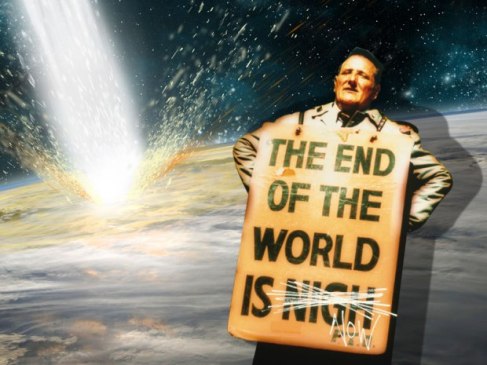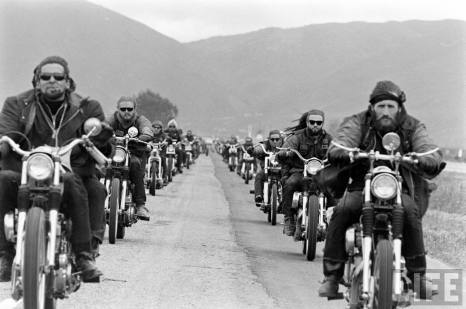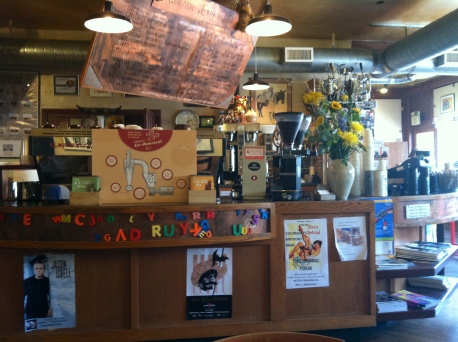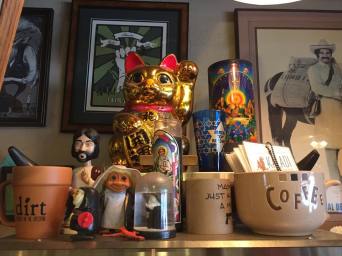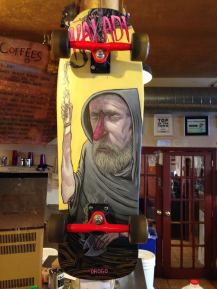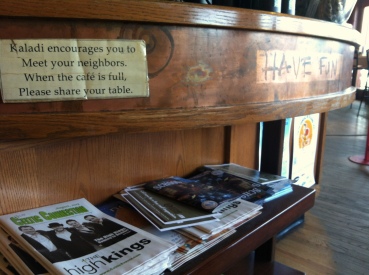The only other person in Socorro’s than the occupied proprietor was a woman who looked like she’d be comfortable on a skateboard. Her hair was long, black. Falling down the front of her forest green tank top. She wore rose-tinted glasses and a hat with large owl eyes that eyed me like a messenger. Who…Are…You? Like the Cheshire Cat, choosing to be mostly invisible. I got the sense that this woman sought the greater thrills and ambiguities of life. Someone who didn’t accept simple answers.
She started talking to us before we realized it was us she was addressing.
“Strange times these days in Denver,” she said. “Unpredictable weather.”
You nodded and I gave her a smile, making small talk, but it wasn’t just small talk she was after.
Behind her, through the windows, I watched the sky darken, dimming the effect of her rosy eyes. Wind whipped through the sidewalk trees, altering the hot summer day. Did this woman sense oncoming disaster like an old injury anticipating rain? She claimed to be a native, but she gave the impression of just passing through. I clung to her transient aura. I like knowing people who know things I don’t.
“It’s like doomsday is lurking,” she laughed. “Repent of your sins or face eternal damnation!”
You gave me a look that said you were ready to leave. Our food should’ve been done by now.
The woman asked if we were astronomers who might be able to enlighten her about the cosmos. “I hope to meet stargazers wherever I go,” she said. “Someone to explain what’s going on.”
“Sorry,” you said, “but I hope you find one someday.”
She gave us a genuine smile, wished us well and left.
We got our food and outside I looked for the woman along the street, but she’d vanished. Was it possible she’d already made it to the corner? An air of mystery floated amidst the strengthening wind.
Cold, hard raindrops fell intermittently, like a warning to take cover. I opened our umbrella for the walk to our car.
“That was weird,” you said about the woman.
You’ve never quite trusted people who don’t have both feet rooted in reality, whereas I, for most of my life, have idolized them. I was raised with a reverence for the unknown—speculation a common pastime in my quiet house; me, an only child.
“I thought she was awesome,” I said.
A gust of wind caught hold of our umbrella, warping the spindly metal frame. I shoved it, useless, into a sidewalk trashcan, relieved to be rid of our lightning rod. The sky lit up like residual fireworks and thunder shook the ground, setting off a nearby car alarm. This was no regular afternoon storm.
“Run,” you yelled, and we made it to shelter as the floods came down, baptizing our car.
The disappearance of the rosy-eyed owl woman, followed by the flash flood, gave me goose bumps and I wondered out loud if she’d been some sort of prophet.
Your eyes said, Coincidence, but you humored my interpretation.
For the next half hour the city was transformed, slowing traffic to a blind crawl and prompting many drivers to pull over. I’ve driven in blizzards that were easier to navigate, and though we made it safely home, I started to wonder if this was indeed the start of the apocalypse.
But then again, humans have been looking for the end since as early as the beginning. But this time—this time might be it.
